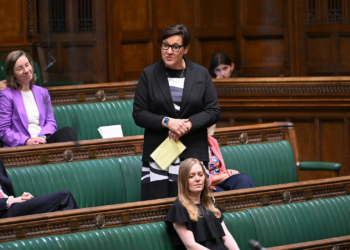When the Government first indicated that it was going to u-turn on welfare spending, the question was how long it was going to take the bond markets to notice that Sir Keir Starmer couldn’t deliver measures announced by his Chancellor.
Perhaps it took Rachel Reeves crying in the Commons to do it. This could be unfair; we don’t know exactly why it happened. But having your finance minister weeping in public is, as the golden rule of modern politics has it, not a good look.
Yesterday’s bond spike has been interpreted by some as a vote of confidence in Reeves by the markets. Perhaps it is, albeit of a largely negative sort. Investors are probably correct that her departure would be a bad indicator – although not necessarily because her immediate successor would definitely be more left-wing.
No, the problem is that recent history suggests that once prime ministers start jettisoning their chancellors and/or closest advisors (the knives are also out for Morgan McSweeney and Liz Lloyd), their authority is shot. Starmer would thus end up in a decaying orbit around the intellectual and ideological black hole which is Labour without money to spend.
To read this morning’s papers, and indeed the general coverage of the welfare rebellion, is to marvel at the vacuousness of the objections. This morning’s Times reports that:
“Lloyd, along with other political aides in Downing Street, have been blamed for the decision to “sell” the policy as a money-saving exercise that failed chime with Labour “values”.”
It is a money-saving exercise, because the Government needs to save money. But it is remarkable that the briefing from the rebels is that they are small children who can’t be told the real reason for a spending cut if it isn’t wrapped in the right fairytale (as if they would ever have admitted that major welfare cuts ‘chime with Labour values’).
The prognosis for the rest of this Parliament is dire. The Government has, surely, too big a majority to fall. Unable to make any serious cuts to public spending, except perhaps continuing to gut capital budgets, Reeves is going to have to break her (second) promise not to raise taxes, and likely do so over and over again.
Politically, that’s bad enough. But without any reform to entitlement spending, it is doubly so. All the extra income will be channelled not into capital investment which might alter the country’s long-term trajectory, but into propping up unsustainable revenue spending, digging the whole deeper and yet deeper – and as voters’ economic circumstances get harder, their attachment to any element of state spending aimed at themselves will only deepen in turn.
So far, so miserable. But it opens up the question of what the Conservatives should do about it. Given that the two policy areas where YouGov gives the party a significant lead are overall economic management and taxation, the Government’s travails are an opening that Kemi Badenoch must exploit.
That will require, in the first instance, having a clear alternative policy on welfare reform – which therefore cannot wait for the slowly-but-surely process of the policy review to conclude sometime next year. The approach the Party has taken to deciding how to handle Labour’s bill suggests that this isn’t imminent.
But the deeper problem is that when it comes to the fiscal position of the British State, working-age welfare reform is a relatively trivial front. Not because it doesn’t have absurd spending items and there aren’t savings to be made, but for the simple reason that Karl Williams set out on this site last year:
“The best estimates suggest that a combination of pensions, adult social care, and NHS spending on the elderly will more than double from roughly 10 per cent to 21 per cent of GDP over the next 50 years – even as the economy doubles in size! So annual spending on the elderly is set to quadruple in real terms, reaching almost £1 trillion in today’s money.
“Tax receipts already amount to around 36 per cent of GDP, the highest level since 1951. If by 2072 we were to meet the increase in elderly spending entirely from tax, then receipts would need to rise by almost a third, to over 46 per cent of GDP. This is equivalent to more than doubling the share of GDP harvested by income tax, or tripling the corporation tax take.”
Welfare reform is important because it is the easiest target, and a government which can’t even make savings there is dead in the water.
But it is only a fraction of the task, and the Conservative Party would find the rest of it far less congenial. Of the three jaws of the demographic vice crushing the public accounts – “pensions, social care, and NHS spending” – which, if any, does the Party have any stomach for cutting?
Not even Margaret Thatcher actually reduced NHS expenditure, and despite austerity the Tories increased it in real terms by 25 per cent between 2010 and 2023. Theresa May paid a very steep price for attempting a relatively modest move towards making social care sustainable, so who is going to be the shadow chancellor who revives the ‘dementia tax’?
Pensions are the obvious saving. Whilst some pensioner poverty exists, and is no less deserving of action than any other poverty, it is absurd for a country with a non-functioning court system and non-deployable military to be hosing untargeted welfare at this country’s wealthiest age cohort.
Yet the Party remains committed not just to the Pension Triple Lock but the Winter Fuel Allowance, perhaps one of the single most easily justified possible cuts, and based on my conversations with senior Tories there is no prospect of that changing.
It isn’t hard to see the political case for that position. But it is important to be clear-eyed about what it means: even with a programme of blood-curdling cuts to working-age welfare spending, a Conservative government unwilling or unable to cut one or more of health, social care, or pension spending would remain locked into this country’s current trajectory of higher and higher taxes, sucking life out of an ailing economy to prop up a welfare state it cannot afford.










![Florida Man With Violent History Arrested for Choking a Cop [WATCH]](https://www.right2024.com/wp-content/uploads/2025/06/Eleven-Stabbed-in-Attack-at-Salem-Homeless-Shelter-Across-From-350x250.jpg)






